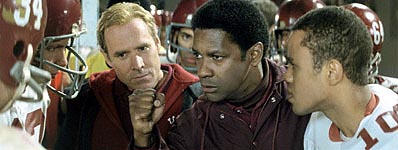Dir. Boaz Yakin
Starring: Denzel Washington, Will
Patton, Wood Harris, Ryan Hurst
Writing about The Blind Side I commented that I must
watch a film about American football before the end of the year – and that
wasn’t it. Remember the Titans is it.
It is the based-on-a-true-story tale of a high school team from Alexandria , Virginia
It is therefore similar in plot
outline to Best Shot / Hoosiers. We have the new coach with
unconventional techniques. We have a ragtag fractious squad inspired to be more
than they thought was possible. And we have triumph snatched from defeat with
the very last ball of the game. But I am glad to say that Remember the Titans manages to be more than just another cheesy
sports movie. It adds another ingredient to the mix. That ingredient – as in Pocahontas and as in The Howards of Virginia – is prejudice.
The Titans are not just one high
school team – they are two. In 1971 the school board merged two schools. Or
rather ‘integrated’ them. Because there had previously been two schools – one
whites only and the other blacks only. Each school had its own American
football team. And each team had its own coach. Black Coach Boone (Denzel
Washington) is made head of this new team; white coach Yoast (Will Patton) is
appointed as his deputy. Together they must find a way to work together and
forge a unified team.
 |
| "Remember team: scissors cuts paper but rock blunts scissors..." |
In this film sport is a means to
change society. The opening narration explains that in Virginia Virginia
Perhaps the biggest challenge is
for Coach Yoast. He has gone from being number one to just being an assistant. It
becomes clear that as soon as the Titans lose just one match Boone will be
sacked and Yoast will take over. The local league even conspire to make that
happen with a series of crooked refereeing decisions. It is up to Yoast to
decide what position he takes. And he, too, commits to the team even though it
means missing out on his former position and on induction in the Hall of Fame.
It’s a good thing that the film
focues on the human elements of the story. Because the sports part is all but
incomprehensible. Shots of the scoreboard are too quick to allow unfamiliar
viewers (like me) work out what is meant to be displayed. We have to rely on
reaction shots and music cues to figure out how the game is going. It appears
that jumping on someone is a good thing in Anmerican football. In the last game
the Titans are trailing 7-3 with only a minute remaining. This is, apparently,
hopeless. But then they do a ‘fake 38 with a back George’ or something and they
win the game. Fake 38s with back Georges obviously get you more than one point.
I have to admit, before watching
the film I did not have high hopes. It was about a sport no one outside the US
What have I learnt about Virginia
When I tend to think of the Civil
Rights struggle in America I
tend to think of places like Alabama and Mississippi Virginia
Can we go there?
Alexandria is just – just – in Virginia across the
Potomac from Washington , D.C.
But it won’t look familiar. No
filming took place in Virginia Georgia Covington
stood in for Alexandria DeKalb
County stood in for T.C. Williams; Shamrock Middle School provided the training
pitch. Berry College
in Mt. Berry Gettysburg , but it did
visit Chickamauga National Park. Decatur Cemetery was used for the funeral scene.
Overall Rating: 4/5

No comments:
Post a Comment